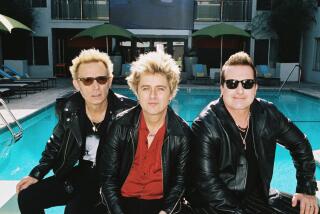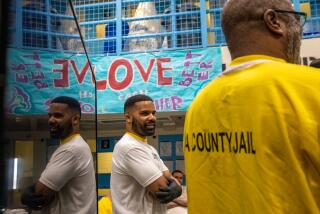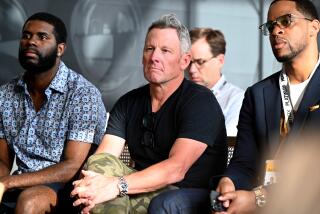Armstrong: Nobody’s buying the witch-hunt line, Lance
- Share via
It’s a pretty neat trick to admit guilt by denying guilt, but once-legendary cyclist Lance Armstrong pulled it off Thursday.
By deciding not to contest charges from the U.S. Anti-Doping Agency that he used performance-enhancing drugs, Armstrong loses everything he’s been fighting to keep since the accusations first arose in 1999: His seven Tour de France victories and a 2000 Olympics bronze medal will be stripped, and he will be banned from major competition for life. So what does he have to gain by giving up? Maybe he can keep a few shattered threads of his reputation, which might be enough to help preserve the Livestrong anti-cancer foundation that has grown into a charity giant thanks to Armstrong’s fame and the inspiration many have derived from his life story.
Meanwhile, though, only the very loyal or the very gullible would be persuaded by Armstrong’s self-serving rant against the USADA, which he accuses of engaging in a “witch hunt” against him. It’s laughable to think that Armstrong, a battler who routinely unleashes teams of lawyers against his accusers, would give up now simply because of “the toll this has taken on my family, and my work for our foundation and on me.” Or because he doesn’t think the USADA’s arbitration process is fair. Make no mistake: Armstrong is quitting because anti-doping officials have assembled too many former teammates ready to testify against him, and too much physical evidence, for him to overcome in a fair forum. Much as fans of Armstrong -- and I count myself among them -- wish it weren’t so, the greatest cyclist of all time isn’t. He is a cheat.
PHOTOS: Lance Armstrong through the years
It’s little comfort that many of the top riders Armstrong competed against were cheaters too. Like Diogenes, cycling officials now must shine a bike lamp on the faces of Armstrong’s Tour de France competitors from 1999 to 2005 in search of an honest man to pick up Armstrong’s stripped titles. Yet doping was so commonplace in cycling a decade ago that it will be a big challenge. That doesn’t make it OK, and it doesn’t make Armstrong less of a hypocrite for spending years vehemently protesting his innocence. Nor is he covering himself in glory now by continuing to deny that he did anything wrong while ducking a trial he clearly knows he can’t win.
According to my few sources in the U.S. cycling community, there’s hardly a wet eye today among top U.S. racers, who have long been turned off by Armstrong’s perceived arrogance. Of course, that kind of me-first attitude can help make people champions. It can also make them cheaters. It’s a shame it turned Armstrong into the latter, because some of us really wanted to believe in him.
ALSO:
Parsing the Republican platform
Cardinal sin? The top U.S. bishop will pray with the GOP
McManus: Gridlock likely in Washington no matter who wins presidential race
Follow Dan Turner on Facebook
More to Read
A cure for the common opinion
Get thought-provoking perspectives with our weekly newsletter.
You may occasionally receive promotional content from the Los Angeles Times.






